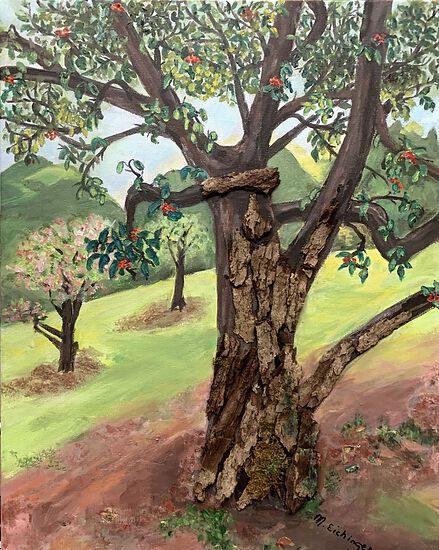
| Many beautiful trees carry thorns. I study them. Instead of staying glued to television during the election I spent time in my studio painting out frustrations. It is a place I go to remind myself that people are basically good and do what they can to survive. Understand. Have Hope! Biden won, but many people are angry. This is especially true of gun wielding, flag flying middle age men. The 2020 presidential election pointed out ways our country is divided, but addressing the fury of so many citizens needs to be tackled immediately. I believe that doing so will reduce unrest and bigotry and make it better for everyone. Non-Hispanic white men without a college degree are committing suicide in record numbers and their concerns need to be addressed. There have been many research papers written over the past five years that focus on white working-class Americans in their 40s and 50s who are dying of suicide, alcoholism and drug abuse. Their high death rates contrast sharply from those of college graduates. They are having a particularly difficult time adjusting to changes brought about by the Fourth Industrial Revolution-the one we are in now. Though I’ve mentioned this concern in previous blogs, I feel it is important enough a subject to dig deeper into their plight. Uneducated white men, fearing loss of masculinity, often wind up joining militias and participating in acts of intimidation. Lies told at the expense of minority groups bolster them into believing they are not at the bottom of society’s totem pole. Unable to adapt to the new reality brought on by advanced technology, they are angry, frustrated and follow QAnon conspiracies with the misguided idea that they will hold back change. Though European countries face the same kind of technological change, men are not killing themselves with guns, drugs or alcohol. The United States is unique in the dramatic way inequality has risen while middle-class incomes have stagnated more than in Europe, Japan, or Asia. As large corporations increased their market share worldwide they left workers with little bargaining power. Outsourcing remains the norm as executives seek low-wage workers over developing company loyalty. Days lack structure, status and meaning for many middle- and low-income Americans. Those who are employed, don’t always know what days or hours they will work each week so it is difficult to make leisure time plans. Lack of loyalty to their employer or business frequently translates into lack of pride in the work they do. There was a time when the corporation or institution a person worked for gave meaning to the person’s life. Miners and factory workers identified with the company that employed them, knowing they would work there for life. Today they rarely have the same connection and fear they are expendable to executives looking for ways to reduce costs. Other factors come into play as well. Men without college degrees are less likely to attend church and less likely to get married. They register a high degree of chronic pain and they find it difficult to do basic things like climb a flight of stairs or socialize. Since they are unhappier they drink and use drugs to excess leading to obesity and heart disease. How can these men be helped to transition through the latest technological revolution? We need to start with empathy for their plight. Imagine how difficult it must have been to go from a horse and buggy agrarian society to life in cities with steam engines, automobiles and assembly line factories. The present economic revolution is equally difficult and already alters the way we live, work and relate to one another. Breakthroughs in artificial intelligence and biotechnology are happening at a faster rate than most people can keep up with, making adjustment difficult. Set against a background of warming environment we are called to transform entire systems of production, management, and governance at breakneck speed. One way to help people adjust is to keep big business from maximizing profits at the expense of their workers. Inequality is sited as the greatest societal concern associated with the Fourth Industrial Revolution. Antitrust laws need to be enforced and there needs to be an evolved form of labor unions to deal with management. Added to labor issues is the fact that the United States suffers by far from having the world’s most expensive health-care system. It drains resources that could be more productively spent on schools, daycare, roads and public transit. And, despite high costs, the American medical system fails to keep large segments of society healthy.Last but not least is the need to reform our healthcare system.To do so, politicians will have to do a better job explaining to the public why our current system does not work. The health of our citizens should be a higher priority than the wealth of the those working in the industry. Education, though, is at the core of preparing present and future generations to survive. To insure everyone is educated, government will have step in and subsidize four-year college degrees and meaningful vocational training. People in their thirties and forties need to be drawn into a massive effort to get them retrained. A demand for highly skilled workers will continue to increase while the demand for workers with less education and lower skills will only decrease. But, education is not just a matter of machine learning. Things that set people apart from machines, such as how to work collaboratively to solve real world challenges and gaining an understanding of different cultural needs and perspectives have to be taught. Now that social scientists better understand what is happening to uneducated white men, we can put our heads together and solve this problem. It is time to act aggressively and compassionately as a nation in order to move it forward. I have hope. References:Brown-Martin,G.(2018) Education and the Fourth Industrial Revolution . Learning to thrive in a transforming world. Keynote talk at Regenerative Global. retrieved from GLOBAL. MacGillis, A. and ProPublica.(2020) The Original Underclass.The Atlantic. retrieved from UNDERCLASS. Reed, I. (2018) the Plight of the White American Male. Haaretz. retrieved from MALE. Schwab, K, (2016)The Fourth Industrial Revolution: What it means, How to respond. World Economic Forum. retrieved from FORUM. Leonhardt,D. & Thompson, s. (2020) How Working-Class Life is Killing Americans, in charts. New York Times. retrieved from KILLING. Art is always for sale. Hawthorn Tree is 20″ x16″ x 2 ” / mixed media on canvas/ $325. Contact me at marilynne@eichingerfineart.com to discuss shipping. _________________________________________________________ Join me on November 17th at 7pm (PST) for a book talk sponsored by Lake Oswego Library. To receive information about how to connect on zoom go tohttps://www.ci.oswego.or.us/library/third-tuesday-author-marilynne-eichinger-0?date=0 and register. Over The Peanut Fence, a book about homeless and runaway, focuses on problems of traumatized youth, many of whom experience the effects of PTSD. Over the past twenty years we have learned a lot about developing brains and are learning how to help them overcome barriers to having a successful life. |

